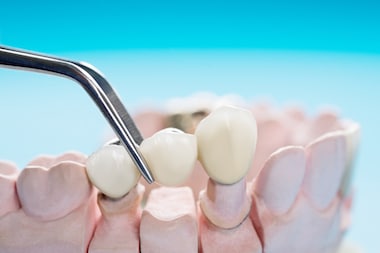If your teeth have been damaged or you’ve had teeth extracted, you may be considering dental bridges. Dental bridges can be a good option to replace damaged or missing teeth. However, it is important to know how a dental bridge works, as well as weighing the costs and benefits of dental bridges.
How Does a Dental Bridge Work?
As the name suggests, a dental bridge crosses the gap between teeth, putting false teeth in between healthy ones. There are a number of different types of bridges, and each is used in different situations. Some bridges are designed to replace a single tooth, others can replace several teeth. Which type of bridge is best for you will depend on the state of your teeth, your bite, and your budget.

Unlike dentures or partial dentures, a dental bridge is fixed to the other, healthy teeth, so it is not removable. A dental bridge can be a safe, effective and affordable way to replace teeth. Before getting a dental bridge, it’s important to understand the process, benefits and costs of dental bridges.
Dental bridges are one of the most affordable ways to replace teeth that have been lost to damage and decay. For dental bridges to work, the neighboring teeth must be strong enough to support the bridge. If they are, the dental bridge will affix to these teeth similar to a tooth cap.
For the most common type of bridge, the traditional bridge, the dentist will have a bridge made that matches the shape and color of your teeth. This allows the bridge to fit comfortably and look like other teeth. Then, your dentist will remove a layer of enamel around the anchor abutment teeth that anchor the bridge, and affix the bridge using caps over the healthy teeth. Once the bridge is fixed, you can care for the dental bridge the same way as your other teeth. Other type of bridges, such as resin-bonded bridges, don’t require caps over the abutment teeth.
Benefits of Dental Bridges
There are a number of benefits, as well as costs, of dental bridges. It’s important to remember that nothing will perfectly replace your natural teeth, so diligent brushing and flossing is the best way to keep your smile strong and white. However, dental bridges can provide a number of benefits if you have missing teeth:
- A dental bridge can be an affordable option for replacing missing teeth
- This will restore your smile and allow you to speak and chew comfortably again
- Dental bridges are not removable and do not need to be cleaned like dentures
- Does not require surgery to replace teeth
Costs of Dental Bridges
While there are a number of benefits to dental bridges, there are also risks and costs. Understanding the costs of dental bridges can help you make the most informed decision about how to replace your missing teeth.
- A dental bridge that does not fit properly can be uncomfortable, and make your teeth vulnerable to decay.
- Dental bridges require that abutment teeth be healthy
- Since dental bridges are not fixed to the jaw, bone loss can occur over time
- A dental bridge will last between 8 to 15 years, and will then require replacement.
Dental Bridges or Implants?
If you’re missing teeth, you may be wondering whether to replace them with a dental bridge or dental implant. Unlike a bridge, a dental implant is fixed into the jaw bone and requires surgery. This process takes long and it is more expensive than a dental bridge, but dental implants will last longer and feel more like your natural teeth. Since the dental bridges are fixed into the jaw bone, they will also help to reduce bone loss.
Should I Get a Dental Bridge?
Whether or not you should get a dental bridge will depend on the state of your teeth, your jaw, and also your budget. If you’re wondering about getting a dental bridge to replace a missing or damaged tooth, make a dental appointment. Your dentist can tell you more about the different types of bridges available, compare and contrast bridges with implants, and help you decide which may be best for you.
